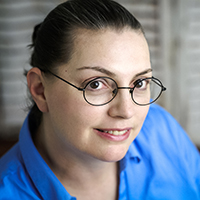 By Dianna Sanchez
By Dianna Sanchez
I participated in the Arlington (Massachusetts) Book Festival last weekend, one of three on a panel discussing revision, and the moderator popped a surprise question on us: What advice would you give a beginning writer? Now, my standard answer is, “Don’t feel guilty for taking the time to write,” which is a common problem I have. But I had a massive chest cold (still do), and my Dayquil was beginning to wear off, so what came out of my mouth instead was, “Hone your craft.”

People tend to think that only geniuses write great works of literature. I hate the myth of the innately talented, the person who can sit down at their keyboard and, on their first try, produce the Great American Novel. Yes, this has happened. But it is exceedingly rare, and no one should expect to succeed on their first try. Most of us have to work long and hard to improve our writing skills, often for many years, before we’re ever published. Joe Haldeman says (and he may be quoting someone), “You have to write at least a hundred pages of crap before your writing starts getting good. So you may as well start now.”
Here’s my short list of ways you can improve your writing craft:
Take Classes
Go get an MFA in creative writing. An MFA also has the nice side benefit of making you qualified to teach writing, which can help support you as writer.
Don’t have the time or money for an MFA? Not really interested in teaching? Apply to the Odyssey Writing Workshop or the Clarion Workshop or any number of other excellent six-week boot camps for writers. This intense experience will forge your writing skills in the flames of peer critique, tempered with the advice and mentoring of seasoned professionals. Already been to one and still need help? Try the Taos Toolbox, a program for Clarion/Odyssey graduates needing a refresher/boost/kick in the pants.
Don’t have the luxury of taking six weeks off from work and family? Check your local extension schools and adult education groups. Many of them have outstanding authors and editors offering classes. If you’re in a major metropolitan area, there may be local writer’s organizations such as Grub Street in Boston and the Writers’ Loft in Sherborn, MA.
Too far from a city or not finding what you need locally? There are also lots of online courses, such as Odyssey Online. Daniel Jose Older has recently started putting up lectures on Skillshare. And there’s a vast wealth of information available on TEDx.
Taking individual classes allows you to target specific weaknesses. I used to be absolutely terrible at dialogue. I took Odyssey Online’s Powerful Dialogue in Fantastic Fiction with Jeanne Cavelos, and now I consistently get compliments on my dialogue.
Join Professional Organizations
The Society for Children’s Book Writers and Illustrators (SCBWI) is an amazing organization dedicated to supporting writers and illustrators at all stages of their careers. SCBWI has no entry requirements other than an annual fee, for which you get the annual edition of The Book, a complete guide to publishing children’s books with examples of query letters, contract advice, discussions of the various subdivisions (picture book, non-fiction, YA, etc.), and lists of reputable agents and publishers. You also get access to their online discussion boards, where writers of all experience levels ask and answer questions about all aspects of writing and publishing. SCBWI also sends out a quarterly newsletter with market advice and writing/illustrating tips. Local chapters of SCBWI hold meetups and actively help writers find critique groups.
Other professional organizations such as the Writer’s Guild, SFWA and HWA are effectively unions, advocating for fair pay and ethical work practices within genre publishing, but they also have resources available for members. However, you may not be able to join unless you have published a certain number of short stories or a novel with recognized publishers within the genre.
Attend Writing Conferences

I don’t mean conventions. I have yet to attend a convention that had panels on using Scrivener or selecting the right agent. Writing conferences exist specifically to help you improve your craft and to connect you with agents and editors. They frequently offer one-on-one meetings with agents and manuscript critiques, both of which give valuable insight into the submission process and help you expand your professional network. SCBWI hosts conferences all over North America. The Association of Writers and Writing Programs also provides this handy directory of writing conferences, so you can search for conferences near you and in your genre.
Join a Critique Group
You should participate in a critique group as much for the opportunity to critique as to receive criticism. When you critique others’ work, you start noticing patterns, common errors, places where plots sag or characters cease to be sympathetic. This makes you much more likely to notice similar problems in your own work. If you are a children’s book writer, SCBWI has a critique group matching service. If you have the time and the stomach for it, volunteer as an assistant editor for a magazine, which means reading the slush pile. This will also give you an appreciation for the guidelines editors insist on, such as readable fonts and double spacing.
Read About Writing
There are thousands of books on writing out there. How do you know which ones to choose? Here’s my go-to list of books on writing:
- Writing Down the Bones, Natalie Goldberg
- Spider, Spin Me a Web, Lawrence Block
- Steering the Craft, Ursula K. LeGuin
- Rock Your Plot, Cathy Yardley
Read EVERYTHING
 Don’t just read within your genre, read newspapers and magazines and nonfiction and poetry. Pay attention to the structure, the rhythm, the craft of everything you read. If you can, take notes. I often can’t read a book without a red pen in hand, and a test of the quality of the book is whether (and when) I forget that red pen.
Don’t just read within your genre, read newspapers and magazines and nonfiction and poetry. Pay attention to the structure, the rhythm, the craft of everything you read. If you can, take notes. I often can’t read a book without a red pen in hand, and a test of the quality of the book is whether (and when) I forget that red pen.
BIC: Butt In Chair
The more you write, the better you get. Almost nothing in life comes without hard work. Be prepared to fail, expect rejections, but keep at it. And if you stop for a while, that’s okay, too. Life is complicated, and priorities shift. Remember, Sheri Tepper didn’t publish her first novel until she was 57. I attended Clarion ’95 and didn’t publish my first novel until this year. All those intervening years? I consider them source material.
I can’t imagine ever getting to the point where I think my craft is perfect, where I have nothing left to improve. So I plan on taking classes, attending conferences, and meeting my critique group for the foreseeable future. There’s always room for improvement.
What advice would you give a beginning author? If you ARE a beginning author, what advice do you feel you need? Let us know in the comments.
 Dianna Sanchez is the not-so-secret identity of Jenise Aminoff, whose superpower is cooking with small children. She is the author of middle-grades fantasy novel A Witch’s Kitchen. Her short fiction appears in the 2017 Young Explorers’ Adventure Guide. A Latina geek originally from New Mexico, she now lives in the Boston area with her husband and two daughters.
Dianna Sanchez is the not-so-secret identity of Jenise Aminoff, whose superpower is cooking with small children. She is the author of middle-grades fantasy novel A Witch’s Kitchen. Her short fiction appears in the 2017 Young Explorers’ Adventure Guide. A Latina geek originally from New Mexico, she now lives in the Boston area with her husband and two daughters.

Reblogged this on Memoir Notes.
LikeLiked by 1 person
Great advice. Thank you.
LikeLike
Carol beat me to the comments I planned to make! Wonderful post, Diana!
The quality of my own writing has dramatically improved from having been a member of SCBWI and attended the regional conference for the past 10 years, becoming active in The Writers’ Loft (Sherborn, MA), participating in a local critique group for more than a decade, plus reading, reading, reading, including kidlit blogs!
LikeLike
Excellent post, Diana. I think you covered it all! Well, maybe you didn’t mention reading #kidlit blogs like this one! Immerse yourself in all things writing is always a great suggestion for the beginning writer.
LikeLike